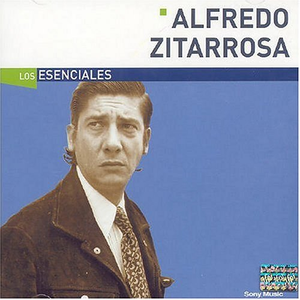Some of his better known songs include “Guitarra Negra”, “El violín de Becho”, “Doña Soledad”, “Pa’l que se va”, “Crece desde el pie”, “Milonga para una niña” and “Adagio en mi país”.
Duerme Negrito
Alfredo Zitarrosa Lyrics
Jump to: Overall Meaning ↴ Line by Line Meaning ↴
Duerme, duerme negrito,
que tu mama está en el campo, negrito...
Duerme, duerme negrito,
que tu mama está en el campo, negrito...*
te va a traer rica fruta para ti,
te va a traer carne de cerdo para ti.
te va a traer muchas cosas para ti.
Y si negro no se duerme,
viene diablo blanco
y ¡zas! le come la patita,
¡chacapumba, chacapún !
Duerme, duerme negrito,
que tu mama está en el campo, negrito...
Trabajando,
trabajando duramente, trabajando sí,
trabajando y no le pagan, trabajando sí,
trabajando y va tosiendo, trabajando sí,
trabajando y va de luto, trabajando sí,
pa'l negrito chiquitito, trabajando sí,
pa'l negrito chiquitito, trabajando sí,
no le pagan sí, va tosiendo sí
va de luto sí, duramente sí.
Duerme, duerme negrito,
que tu mama está en el campo, negrito...
(Versión de Atahualpa Yupanqui, registrada en París en 1969, que recogen distintos intérpretes, y no es la original)
Daniel Viglietti y Mercedes Sosa, que levanta la versión de aquél, dicen mobila, en lugar de negrito.
Los otros intérpretes le hacen modificaciones mínimas, no significativas.
"Duerme negrito" is a lullaby that originates from Uruguay and has become popular throughout Latin America. The song is an expression of maternal love and protection for a Black child. The lyrics speak of a mother who is away working in the fields, gathering food and other goodies for her child. She promises to bring him quails, fruits, pork, and other things that will make him happy. The mother encourages the child to sleep because if he doesn't, a white devil will come and eat his little foot. The song paints a picture of the harsh reality of a Black child's life in a colonial society, where the devil is seen as a symbol of oppression and exploitation.
The lyrics of "Duerme negrito" are accompanied by a simple and repetitive melody that enhances the calming effect of the song. The music and lyrics combine to create a hypnotic effect, which serves to soothe the child's fears and worries. The song has a universal appeal, as it speaks to the universal human experience of seeking comfort and security.
The song has become an important symbol of Black identity and resistance in Latin America. The lyrics celebrate Black culture and identity, highlighting the beauty of Blackness and the strength and resilience of Black people in the face of adversity. The song has been embraced by the Black community as a symbol of their resistance to oppression and marginalization.
Line by Line Meaning
Duerme, duerme negrito, que tu mama está en el campo, negrito...
Sleep, sleep little black one, because your mother is in the countryside, little black one...
Te va a traer codornices para ti, te va a traer rica fruta para ti, te va a traer carne de cerdo para ti. te va a traer muchas cosas para ti. Y si negro no se duerme, viene diablo blanco y ¡zas! le come la patita, ¡chacapumba, chacapún
!
She's going to bring you quail for you, she's going to bring you delicious fruit for you, she's going to bring you pork for you, she's going to bring you many things for you. And if the little black one doesn't fall asleep, the white devil comes and snap! They eat his little foot, bang, bang...
Trabajando, trabajando duramente, trabajando sí, trabajando y no le pagan, trabajando sí, trabajando y va tosiendo, trabajando sí, trabajando y va de luto, trabajando sí, pa'l negrito chiquitito, trabajando sí, pa'l negrito chiquitito, trabajando sí, no le pagan sí, va tosiendo sí va de luto sí, duramente sí.
Working, working hard, working yes, working and not getting paid, working yes, working and coughing, working yes, working and in mourning, working yes, for the little black one, working yes, for the little black one, working yes, they don't pay him yes, he's coughing yes, he's in mourning yes, working hard yes.
Daniel Viglietti y Mercedes Sosa, que levanta la versión de aquél, dicen mobila, en lugar de negrito. Los otros intérpretes le hacen modificaciones mínimas, no significativas.
Daniel Viglietti and Mercedes Sosa, who lifted that version, say 'mobila' instead of 'negrito'. The other interpreters make minimal, insignificant modifications.
Writer(s): Hector Chavero, Atahualpa Yupanqui
Contributed by Anthony L. Suggest a correction in the comments below.

@lorenzadelcarmengonzalez1570
Me encanta esta canción con su inigualable voz. Yo les cantaba a mis hijas para que duerman ; hoy ellas tienen 40 ,38 y 30 años.
@hugofernandezhugofernande6039
Esta maravillosa interpretacion de don Alfredo me emociona hasta las lagrimas siempre. Saludos al Cielo.
@concepcionflores6081
Un deleite escuchar a el gran Zitarrosa. Saludos desde Oaxaca México, 2024.
@manulisandro5522
Inigualable el Maestro!!! Duerme Amaia....
@danielguediguian7730
¡LO MÁXIMO DEL FOLCLORE #URUGUAYO! SALUDOS DESDE SAN PABLO. ¡GRACIAS....☆FELIZ 2023☆
@juancarlosllanos8793
Un eximio músico, cantor, poeta y una presentación personal impecable. Un repertorio literario y musical inspirado por una estética propia de nuestro continente de América del Sur. Un compromiso con los de abajo, humillados, ofendidos. Un inolvidable cantante y autor de la Patria grande. Orgullo de Uruguay de latinoamérica.
@celiasuarez8382
Con Zitarrosa? Qué manjar. Gracias por compartir.
@facundosequeira3947
Sin dudas, no dejemos perder este eslavon de la revolución💪